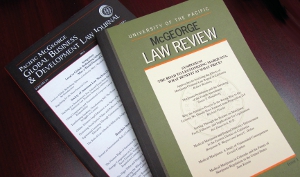Between Truth and Provocation: Reclaiming Reason in American Legal Scholarship [reviewing DANIEL A. FARBER AND SUZANNA SHERRY, BEYOND ALL REASON: THE RADICAL ASSAULT ON TRUTH IN AMERICAN LAW (1997)]
Document Type
Book Review
Publication Date
1998
Abstract
Daniel A. Farber and Suzanna Sherry, Beyond All Reason: The Radical Assault on Truth in American Law. New York and Oxford: Oxford University Press, 1997. Pp. 195. $25.00. Truth has regained a strong voice in American legal scholarship. Like a groggy patient slowly emerging from a traumatic operation, legal theory is being coaxed back to consciousness by Dan Farber and Suzanna Sherry. They are fighting the debilitating illness of radical multiculturalism and its attendant relativism; they proclaim that the cure can be found in the power of truth, the force of reason, and the integrity of the word. Unfortunately, the patient is unlikely to recover while in the care of Farber and Sherry, even though their operation must be judged a success on its own terms. By equating "reason" with "truth," Farber and Sherry make a diagnostic error that one might expect from the country doctors who embrace right-wing legal ideologies but which is unforgivable for such talented and levelheaded practitioners. Consequently, a tale foretold emerges from the Oxford University Press as predictably as the changing season: Rationality is deployed against emotional appeals, and truth is championed against relativism. It's déjà vu, all over again. Farber and Sherry's attack on multiculturalism is only the most recent manifestation of a conflict that began at the dawn of the Western intellectual tradition in ancient Greece. The Sophists - a group of itinerant, cosmopolitan, and irreverent teachers - gained notoriety as the mythical-poetic, parochial, and aristocratic world of Homeric Greece was giving way to the self-reflective, pan-Hellenic, and democratic world exemplified by Periclean Athens. The Sophists contributed to the breakdown in traditional social patterns by demonstrating that all received wisdom can be challenged and reversed with rhetorical critique. They were known for teaching the skill of making the weaker argument appear stronger, which proved to be a threat to the established order because it subjected every dominant discourse to interrogation and potential rejection in favor of what initially appeared to be untenable. Plato's philosophy, of course, was defined largely by his vitriolic attacks on the relativist implications of Sophistic teachings and by his reassertion of a stable, accessible realm of rationality rising above the fluidity of Sophistical argumentation. Plato's defense of the philosophy of truth against the rhetoric of the probable runs through our intellectual heritage, with philosophy maintaining the dominant position for much of this history. Farber and Sherry appear on the scene of contemporary legal theory to slay again, for the thousandth time, the Sophistic serpent.
Publication Title
YALE J. LAW & HUMAN.
ISSN
1041-6374
Volume
10
First Page
605
Last Page
646
Recommended Citation
Francis J. Mootz III,
Between Truth and Provocation: Reclaiming Reason in American Legal Scholarship [reviewing DANIEL A. FARBER AND
SUZANNA SHERRY, BEYOND ALL REASON: THE RADICAL ASSAULT ON TRUTH IN AMERICAN LAW (1997)],
10
Yale J.L. & Human.
605
(1998).
Available at:
https://scholarlycommons.pacific.edu/facultyarticles/656



